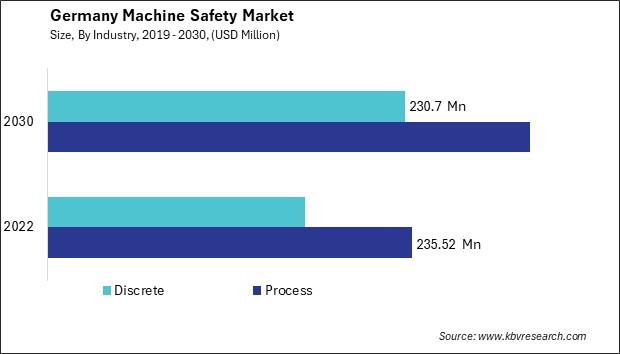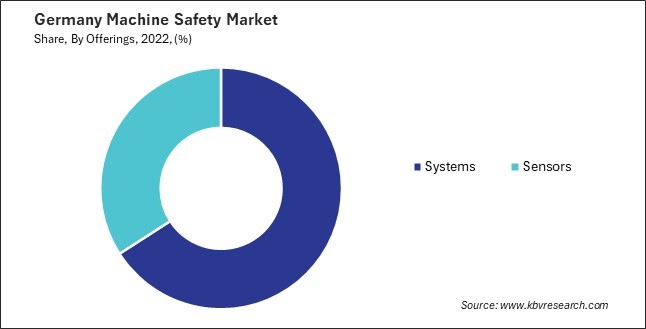Int'l : +1(646) 832-2886 | query@kbvresearch.com
Int'l : +1(646) 832-2886 | query@kbvresearch.com
Published Date : 20-May-2024 |
Pages: 97 |
Formats: PDF |
The Germany Machine Safety Market size is expected to reach $542.40 Million by 2030, rising at a market growth of 3.9% CAGR during the forecast period.
The machine safety market in Germany has witnessed significant growth, reflecting the country's commitment to industrial safety standards and regulations. Germany, known for its robust manufacturing sector, strongly emphasizes ensuring the safety of machinery and equipment to protect workers and assets. The German manufacturing landscape, characterized by its strong presence in the automotive, chemical, and engineering industries, has fueled the demand for machine safety technologies. German manufacturers are increasingly investing in cutting-edge machine safety solutions to mitigate risks and ensure a secure working environment for their workforce.

According to the International Trade Administration, by 2025, 84 % of German manufacturers plan to invest approximately EUR 10 billion (USD 10.52 billion) annually into smart manufacturing technologies, including the automotive industry. Amidst this transformative wave, it is evident that the machine safety market in Germany stands to gain significantly from these substantial investments and advancements in smart manufacturing technologies.
The COVID-19 pandemic has had a notable impact on the machine safety market in Germany. The crisis prompted a revaluation of workplace safety protocols, leading to an increased focus on automation and remote monitoring solutions. The need for contactless and touch-free operations has accelerated the integration of safety technologies that minimize human-machine interactions. German companies have recognized the importance of resilient and adaptable safety systems to maintain operations during unforeseen disruptions.
Germany's food and beverage industry is experiencing a significant expansion, driven by a growing population, changing consumer preferences, and technological advancements. As this sector evolves, the integration of advanced technologies, particularly in machine safety, has become imperative to ensure the well-being of German workers, compliance with regulations, and the efficient functioning of production processes. In Germany, renowned for its engineering prowess, the adoption of cutting-edge safety measures in the food and beverage manufacturing sector is gaining traction.
According to Germany Trade & Invest, Germany's food and beverage industry is the fourth-largest sector in the country, contributing a substantial production value of EUR 185.3 billion in 2020. Notably, the sector experienced remarkable growth, with total revenue from food retailing surging by 8.2% to reach EUR 227 billion in the same year. Now, paralleling this success, the machine safety market in Germany is also witnessing an expansion, with robust growth and noteworthy developments in ensuring safety measures within the food and beverage manufacturing processes.
One key driver behind integrating advanced safety systems is the emphasis on employee welfare. Germany places a high value on occupational safety, and implementing state-of-the-art safety features in machinery aligns with the nation's commitment to providing a secure working environment. Automation technologies, such as collaborative robots equipped with safety sensors, are becoming integral to production lines, mitigating the risk of accidents and ensuring the well-being of workers.
The country's adherence to stringent safety standards necessitates continuous innovation in safety technologies to meet and exceed regulatory requirements. Manufacturers in the food and beverage industry in Germany are investing in safety solutions to comply with existing regulations and stay ahead of emerging safety standards.
Moreover, the efficiency gains associated with advanced safety systems contribute to the industry's expansion. By incorporating technologies like machine learning algorithms and real-time monitoring, German food and beverage companies are enhancing overall operational efficiency, minimizing downtime, and optimizing production processes. Hence, Germany's food and beverage industry is witnessing robust growth fueled by technological advancements, particularly machine safety, driven by a commitment to employee welfare and stringent safety standards.
In Germany, the machine safety market has witnessed a significant surge in adopting two-hand safety controls, marking a notable shift in industrial safety practices. Two-hand safety controls are designed to minimize the risk of accidental injuries by requiring operators to use both hands simultaneously to initiate a machine's operation. This ensures that the operator's hands are away from the potentially hazardous areas, reducing the likelihood of accidents. The rising adoption of these controls in Germany is attributed to their effectiveness in mitigating workplace risks and promoting a safer operational environment.
One of the key drivers behind the increasing popularity of two-hand safety controls is the stringent safety standards prevalent in Germany. The nation's commitment to ensuring the well-being of its workforce has led to a proactive approach to implementing advanced safety measures across industrial settings. Companies operating in Germany recognize the importance of adhering to these regulations to protect their employees and avoid legal repercussions and financial penalties.
Moreover, the emphasis on automation and Industry 4.0 initiatives in Germany has further fueled the adoption of two-hand safety controls. As industries integrate more advanced machinery and robotic systems into their operations, the need for enhanced safety measures becomes paramount. Two-hand safety controls provide a reliable solution to this demand, aligning with the country's vision of a technologically advanced and safe industrial landscape. Thus, Germany's surging adoption of two-hand safety controls reflects a commitment to stringent safety standards driven by integrating advanced technologies in pursuing Industry 4.0 initiatives.

The machine safety market in Germany is a dynamic and rapidly evolving sector driven by the country's robust industrial landscape and commitment to ensuring workplace safety. Several companies play a pivotal role in shaping and advancing machine safety solutions, catering to the diverse needs of the German industrial sector. One prominent player in the German machine safety market is Pilz. With its headquarters in Ostfildern, Pilz specializes in automation technology and safety solutions. The company offers a comprehensive range of products and services, including safety sensors, control systems, and consultancy services.
Another key contributor to the machine safety sector in Germany is Leuze, based in Owen. The company specializes in sensor solutions for industrial automation and safety. Leuze's portfolio includes safety switches, light curtains, and safety relays, catering to the diverse safety requirements of German manufacturing facilities.
In the realm of safety consulting and certification, TÜV Rheinland stands out as a major player in Germany. With its headquarters in Cologne, the organization offers a wide range of services, including safety assessments, testing, and certification of machines and industrial equipment. The company is crucial in ensuring that German businesses comply with national and international safety standards.
Pepperl+Fuchs, headquartered in Mannheim, is a renowned name in industrial automation and safety. The company specializes in explosion protection and sensor technology, providing safety solutions for hazardous environments. Pepperl+Fuchs' contributions to machine safety make it a significant player in the German machine safety market, especially in industries where safety is paramount. These companies collectively contribute to the growth and development of the machine safety market in Germany, offering a diverse range of solutions to meet the specific needs of the country's industrial landscape.
By Industry
By Offerings
By Components